Why is Dmitrievskaya Parents' Saturday October 28th? Dmitrievskaya Parents' Saturday: what needs to be done on this day
At the end of October, believers will experience Parents' Saturday - the day of universal remembrance of the dead. It directly concerns each of us, because it helps to honor the blessed memory of deceased loved ones.
The annual date of the Demetrius commemoration varies depending on Orthodox celebrations. In 2017 it was moved to October 28. On every parent's Saturday, Christians observe all church traditions: they visit the temple of God, light candles for the repose, read prayers, and visit the cemetery. According to ancient legends, it is on such days that the souls of the deceased descend from Heaven to earth and look after the living, watching how they preserve customs and preserve memories.
The history of Dmitrievskaya parental Saturday
Demetrius Saturday is a significant day for the Orthodox people, which they await with trepidation and love. At this time, every person can offer prayers to the saints, reverently remember the departed and help them go through all the thorns on the way to the Kingdom of Heaven.
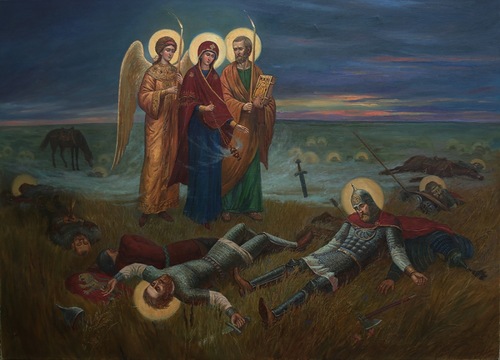
It was not by chance that Dmitrievskaya Parents' Saturday got its name. Everyone is familiar with the legend about the life of the great Dmitry Donskoy. The Moscow prince defeated Mamai, defeating him in the Battle of Kulikovo Field. The Battle of the Don and the victory over the Golden Horde were overshadowed by grief: many families lost loved ones that day. But the memory of the heroes who gave their lives for a bright future, the Fatherland and faith in the Lord remained in the hearts of people. By decree of Dmitry Donskoy and the blessing of Sergius of Radonezh, a special day was established in the 14th century when Orthodox people they offered prayers and remembered the heroes. Since then, a tradition has appeared in Rus' to commemorate the deceased annually.
After a while, the commemoration of the soldiers faded into the background, and parental Saturday acquired a different meaning. Now believers honor the memory of every person who has left this world. Today, ancient traditions have grown into a real holiday, which is accompanied by a special divine liturgy in churches and a great memorial service. People pay homage to the saints, first of all cleansing their souls, and prayerfully ask for a peaceful life for their departed loved ones in Heaven.
Traditions and meaning of parental Saturday
Every year the date of St. Demetrius Saturday changes, therefore, in order not to miss such a significant event, it is necessary to follow the Orthodox calendar of church holidays. This way you won't miss anything important, showing God that you live according to all of his commandments.
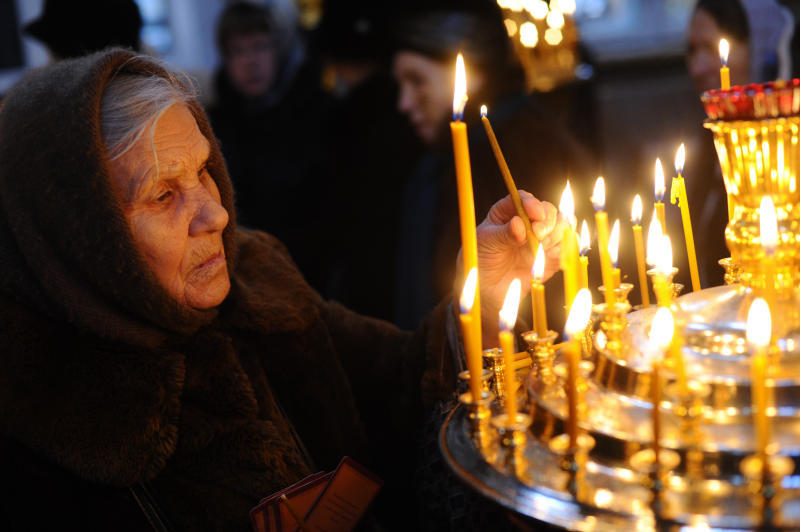
On St. Demetrius Saturday, as on all other parental days, Christians go to churches to attend services and order prayers for the dead, which will be read by the clergy, as well as light candles for the repose and remember the lives of those who were dear and loved.
After the service, people visit the cemetery and put all the graves in order, and then go home, where they commemorate with their families kind words deceased relatives. According to traditions, on this day a funeral dinner should be prepared, putting on the table everything that the deceased relatives loved during their lifetime. In ancient times, it was believed that the souls of the dead visited their loved ones and their previous home, checking how things were going in the family without them.
IN pre-revolutionary Russia Each family had a “memorial book” that was passed down from generation to generation. It was a notebook or book in which all the names of the deceased members of this family were written. This was done in order to show the younger generation that life is fleeting, but memory always lives. And people prayed for everyone, saving sacred custom as a symbol of eternal memory.
But St. Demetrius Saturday carries an even greater meaning - it reminds each of us of all those who died, suffered and gave their lives for faith and peace on earth. This list includes people who fought for their Motherland and Christ, and those who accomplished the feat of faith - they were faithful to the Lord until the very end.
The traditions of Dmitrievskaya parental Saturday have reached us after so much time, without losing anything important, even acquiring even greater meaning for the Orthodox people. Don’t forget about your loved ones, keep the best memories of them in your heart, because as long as the memory is alive, they are also alive. We wish you peace in your soul. take care of yourselfand don't forget to press the buttons and
28.10.2017 05:54
In Orthodoxy there is a large number of holidays and important dates. Easter week is immediately followed by Radonitsa. This is not a holiday, but one...
The Orthodox calendar is an obligatory and integral part of the life of believers.
By looking into it, you can find out the dates of Lent and holidays, the days of parental Saturday, and also plan your schedule for the next year - workdays, weekends, landings, fasting and memorial days.
Parents' Saturdays in 2017 have clearly established dates. If you don’t have time to go to church and light a candle, then you should definitely go to the graves of the departed. Deliver flowers, clean up and pay respects.
There are not many parent's Saturdays throughout the year, but they allow us to stop in the daily bustle and remember, at least for a minute, about those people who were and remain very dear to us. It is important to have the whole meaning of Lent in your heart and limit yourself to weaknesses.
October 28 - Dmitrievskaya Parents' Saturday. The holiday is named in honor of Demetrius of Thessalonica, the holy great martyr. This day was originally set aside to commemorate the deceased soldiers who fought at the Battle of Kulikovo. Now Dmitrievskaya Parental Saturday is a day of remembrance of all deceased Orthodox Christians.
Every Orthodox Christian honors sacredly church holidays and spends time in prayer. They open their souls to the Lord, cleanse their consciousness and help them take the righteous path. Words coming from the heart always find a response in Heaven, so there is no place for prayer words huge role. You can pray at home in front of holy images, by candlelight, or simply in a moment of weakness and doubt.
What to do on Parents' Day
Quite a large number of people visit relatives and friends at the cemetery on Easter. Many, unfortunately, adhere to the blasphemous custom of accompanying visits to the dead with drunken wild revelry. And those who do not do this very often do not even know when on Easter days they can (and should) remember the dead.
The first commemoration of the deceased after Easter takes place on the second Easter week(week), after Fomin Sunday, on Tuesday. And the widespread tradition of going to the cemetery on the Easter holiday itself sharply contradicts the institutions of the Church: before the ninth day from Easter, commemoration of the dead cannot be performed. If a person passes into another world on Easter, then he is buried according to a special Easter rite.
Like many Orthodox clergy, priest Valery Chislov, rector of the Church of the Dormition Holy Mother of God at the Assumption Cemetery in Chelyabinsk, warns against rash actions and other actions committed out of ignorance on the feast of Radonitsa:
 Save nature - buy an artificial Christmas tree! Odorless, durable, effective and practical. Passed all inspections of the Sanitary and Epidemiological Service and has all the necessary quality certificates. Delivery to all regions of Russia within 5 days. Garland as a gift!
Save nature - buy an artificial Christmas tree! Odorless, durable, effective and practical. Passed all inspections of the Sanitary and Epidemiological Service and has all the necessary quality certificates. Delivery to all regions of Russia within 5 days. Garland as a gift! “It should be remembered that a cemetery is a place where one should behave with reverence. It is sad to see how some people drink vodka there and sing worldly songs. Someone crumbles bread and eggs onto the grave mound and pours alcohol. Sometimes they get into a real riot. All this is more reminiscent of pagan funeral feasts and is unacceptable for Christians. If we already took food to the cemetery, it is better to distribute it to the poor. Let them pray for our departed, and then the Lord may send some consolation to our relatives.”
When you come to the cemetery on the feast of Radonitsa, you need to light a candle and perform litia (pray intensely). To perform litia during the commemoration of the dead, a priest should be invited. You can also read the Akathist about the repose of the dead. Then you need to clean up the grave, be silent for a while, remembering the deceased.
There is no need to drink or eat in a cemetery, it is unacceptable to pour alcohol on a grave mound - these actions insult the memory of the dead. The tradition of leaving a glass of vodka with bread on a grave is a relic of pagan culture and should not be observed in Christian Orthodox families. It is better to give food to the poor or hungry.
On the last Saturday before November 8, the Day of Remembrance of the Great Martyr Demetrius of Thessaloniki, it is customary for Orthodox Christians to remember deceased relatives.
In 2017, Parents' Saturday was moved to October 28 due to the coincidence with the feast of the Kazan Icon of the Mother of God (November 4).
The Observer decided to find out what traditions should be observed on this day.
Dmitrievskaya Saturday is the last memorial day of the year, when deceased ancestors were remembered.
history of the holiday
The tradition of commemorating the dead on the Saturday before the day of remembrance of the Great Martyr Demetrius of Thessaloniki was established by Prince Dmitry Donskoy after the Battle of the Kulikovo Field. The Battle of Kulikovo ended on the day of the Nativity of the Blessed Virgin Mary on September 8, 1380, after which Prince Dimitri Ioannovich visited the Trinity-Sergius Lavra. In the Trinity Monastery they commemorated the Orthodox soldiers who fell in the Battle of Kulikovo, funeral service and a common meal.
Archbishop Dimitri believed that Dimitrievskaya parental Saturday replaced the pagan funeral feasts that previously existed among the Slavs. Trizna is part of the pagan funeral rite at Eastern Slavs, which consisted of songs, dances, feasts and military competitions in honor of the deceased. The funeral feast was performed near the burial site after the burning of the deceased. Later, this term was used as a synonym for the “wake” ritual.
Traditions, or what to do on this day
Since the beginning of the 20th century, Dmitrov Saturday was celebrated very solemnly: they went to the graves of their deceased relatives and served memorial services here, and made rich offerings to the clergy. Women wailed at the graves of their parents and closest relatives.
On the Saturday before Dmitriev's Day in Rus', a “farewell wake” was celebrated for the deceased. In central Polesie, funerals on Friday were fasting and were called “grandfathers”, and on Saturday they were fast and called “baba”. Dmitrov week is called parental and grandfather's week. In Lithuania and Belarus this day was called the “Feast of the Goat”, where the goat player, guslar, priest and singer took precedence.
On Dmitrievskaya Saturday It was customary to bake ritual pies, take them to the graves and leave them for the souls of the departed.
On Saturday night, Serbs, Montenegrins and Macedonians put bread, blessed water and wine on the table, because they believed that the souls of the dead would come at midnight. Among the Catholic neighbors (Croats and Slovenes), it was customary to go to the graves of their ancestors and light candles on them, bringing drink and food for the dead. In Serbia and Montenegro, small breads were baked for the dead, different in shape for men and women.
Like any memorial day, Dmitrov Saturday is celebrated with memorial services, funeral prayers, visits to cemeteries and special memorial meals. IN folk tradition Dmitrov Saturday also imprinted the former pre-Christian customs of the Slavs associated with the cult of ancestors. So, for example, in addition to church funeral prayers, on the eve of Saturday it was customary to leave clean water and new brooms for the souls of the departed. In a similar way At night, a specially prepared dinner was left on the table so that the visiting ancestors could be satisfied. Treats for the deceased were also taken to the cemetery. In general, the very scope and scale of the celebration on this day in Rus' testifies to the merging of two traditions - the pagan holiday of ancestors and christian day remembrance of the dead.
IN modern tradition On this day, Orthodox Christians first attend a service in the church, and then go to the graves of the dead, where they commemorate the deceased.
The day before, on Friday evening, the so-called Parastas is served in churches - a memorial evening service. And on Saturday itself, in the morning, a funeral liturgy with a memorial service takes place. As donations on this day, it is customary to take food to the temple, with the exception of strong alcoholic drinks and meat.
Please note that Dimitrievskaya Saturday is the last parent's Saturday in 2017. Next Parents' Saturday is February 10, 2018.
This memorial service falls on the Saturday preceding the memory of St. Vmch. Demetrius of Thessalonica - patron saint of the prince. Dmitry Donskoy, at whose suggestion, after the Battle of Kulikovo, an annual commemoration of soldiers was established.
Big Dmitrievskaya Parents' Saturday in 2017, what date
It happens that parents' memorial Saturdays coincide with others Orthodox holidays, therefore, to avoid confusion, memorial days are moved to another date. What Christians are warned about in advance.
This year, Dmitrievskaya Saturday also coincides with another holiday. November 4 is celebrated as Kazan Day Mother of God, That's why funeral Saturday postponed a week earlier and will be celebrated on October 28.
Dmitrievskaya Parents' Saturday, as celebrated
October 28 is the last memorial parental Saturday of the year, Dimitrievskaya, according to the secular calendar established by Peter I, and according to the Church calendar Gregorian calendar who starts church year September 1 (14), this is the first parents' Saturday of the year.
Every day of the week in Orthodox Church dedicated to a special memory. Saturday is dedicated to the memory of all Saints and deceased. The Holy Church prays every Saturday for its deceased members and asks God for eternal peace for them after a sorrowful earthly life. Except daily prayers and prayers on Saturdays, there are separate days of the year, mainly dedicated to prayers for the departed - parental days.
On these special memorial Saturdays, the Church calls on the living to come to church to make a special prayer for their departed relatives, and on ecumenical Saturdays, the Church prays for the repose of all who have ever lived on earth, all Christians who have died from time immemorial.
In the liturgical circle of the Russian Orthodox Church, Ecumenical memorial parental Saturdays are noted: Meat, three Lenten parental Saturdays, Trinity parental Saturday. Two memorial Saturdays, Radonitsa and Dimitrievskaya, arose on Russian soil, and are not Ecumenical.
There is also a commemoration of deceased soldiers on the day of the Beheading of John the Baptist on September 11, and on May 9, on Victory Day, our Holy Church commemorates “all the soldiers who were killed on the battlefield for the Faith and Fatherland, who laid down their lives.”
Dmitrovskaya Parents' Saturday in 2017 in Russia
Among the Slavs, memorial days in the national calendar do not coincide with “Parents' Saturdays” church calendar; Not all “parental Saturdays” of the church calendar are celebrated among the people. It was customary to remember “parents” the day before big holidays: before Shrovetide, before Trinity, before the Intercession and before Dmitrov's day. In Polesie, this list was supplemented by Michaelmas Saturday and memorial Fridays. Among the Eastern Slavs, the main calendar memorial days in many places were considered: Radonitsa, Trinity Saturday, Dmitrievskaya Saturday.
Parents Saturday, what is it?
Parents' Saturday- V Orthodox tradition day special commemoration deceased Orthodox Christians, and above all, their deceased parents. Canonical days for visiting the graves of ancestors and other relatives, where memorial services are held. The days of special remembrance of the dead in the Orthodox Church are five parental Saturdays: Meat-free universal parental Saturday (Saturday 2 weeks before Lent); Trinity Ecumenical Parental Saturday (Saturday before the Holy Trinity, on the 49th day after Easter); parents' 2nd Saturday of Great Lent; parents' 3rd Saturday of Great Lent; parents' 4th Saturday of Great Lent.
Orthodox traditions of Dmitrievskaya parental Saturday
Those Christian believers who strictly adhere to church canons come to church services on Friday evening before parental Saturday. At this time, a great funeral service, or parastas, takes place. All troparia, stichera, chants and parastas readings are dedicated to prayer for the dead. On the morning of the memorial Saturday itself, the funeral Divine Liturgy is celebrated in churches, after which a general memorial service is held.
To remember your deceased relatives in church, you need to prepare notes in advance with the names of the deceased. In the note in large in block letters it is necessary to write the names of those who should be remembered. All names must be in church spelling and in the genitive case. It is customary to bring Lenten products to the temple as a donation - bread, sweets, fruits, vegetables. But meat products or alcohol (except Cahors) are not allowed to be donated.
On Dmitrievskaya Parental Saturday, all Christian believers visit the graves of their deceased relatives, memorial services and funeral litias are held in temples, churches and cemeteries, and funeral meals are held.
The morning of Demetrius Saturday must begin with visiting church and praying for the repose of the souls of deceased Christians. Unlike others parenting days, Dmitrievskaya Saturday also carries a special meaning: established after the Battle of Kulikovo, it reminds us of all those who died and suffered for Orthodox faith. If it is not possible to visit a temple or cemetery, you can pray for the repose of the deceased in home prayer.
Great parenting in 2017, do's and don'ts
It is believed that Dmitrievskaya Saturday is the time when winter replaces autumn, so you need to finish all preparations for frost before this day. Traditionally, on the eve of Saturday, people go to the bathhouse. It was believed that if someone had not gotten married before this day, they would not get married this year, since severe frosts were coming. And if it’s cold on Dmitry and snowing, spring will be late and cold, but if there is a thaw, spring will be warm.
By ancient custom, on parental Saturdays it was customary to eat kutya - a mandatory dish funeral meal. Sweet porridge was usually prepared from whole grains of wheat or other cereals with the addition of honey, as well as raisins or nuts. True, today few people follow it.
Prayer for the departed
Rest, O Lord, the souls of Your departed servants: my parents, relatives, benefactors (their names) and all Orthodox Christians, and forgive them all sins, voluntary and involuntary, and grant them the Kingdom of Heaven. During church services, Orthodox people remember by name many generations of their deceased ancestors.
Dmitrievskaya Parental Saturday is the day on which Orthodox believers pay tribute to the memory of their ancestors.
The remembrance of the dead is traditionally performed on the first Saturday of November, November 4, 2017. Since the day of the Kazan Mother of God is celebrated on this date this year, parental Saturday was moved to October 28, 2017.
History of Dmitrov Saturday
It’s very old and probably many don’t remember why Orthodox people commemorate their dead at this particular time. There are several Parents' Saturdays throughout the year, and this one is special...
Saturday in Holy Scripture is a special day. In the Old Testament it is a day of rest, and in the New Testament it is a day of forgiveness and remission of sins. And it is no coincidence that Saturday was chosen by the Church for the cathedral commemoration of the heroes of the Battle of Kulikovo. The day before holiday- Resurrection, when, according to custom, all Christians should be in church, believers gathered to pray for the repose of the souls of brothers in faith.
…That day was a day of great joy and great sadness. The messenger of Prince Dimitri reached the gates of Moscow in a matter of days, and by the time the militia returned, the residents - priests, monks and laymen, old and young - with icons and banners went to the outskirts of the city, to the place, below Yegoryevskaya Hill, from where the street leading to The Kremlin and big trade.
Now it is called Varvarka (in honor of the Church of St. Great Martyr Barbara, built later, at its very beginning).
From Kulishki one could see the domes of the temple in honor of the Holy Great Martyr and Victorious George - “Egoria”, as it was popularly called. Along this very street, asking for a blessing from the patron saint of Moscow, the Russian militia marched to the Battle of Kulikovo. It was decided to go back along the same street. The road of hope, prayer, thanksgiving and tears - that’s what it became for the militia and townspeople.
Wives, mothers, children and elders were eagerly awaiting theirs. “The messenger brought the news that the losses were enormous. “They went out to meet the prince and the squad, knowing that a great many carts with the wounded and dead were following them. Shouts of joy, crying, glorification of God, and over this entire sea - a heartfelt prayer for the repose of the souls of the Orthodox soldiers killed on the Kulikovo field.
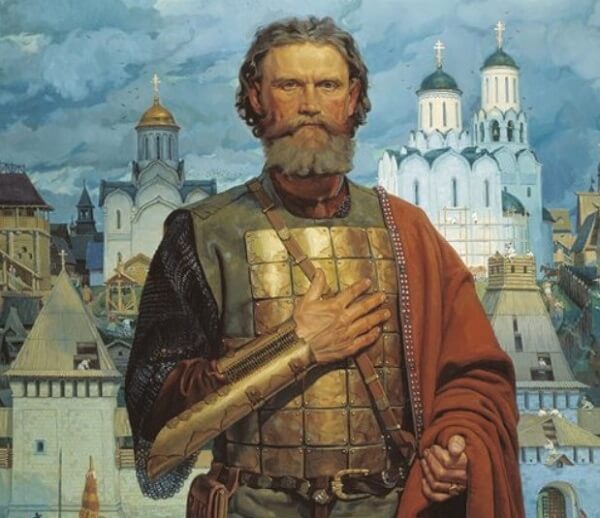
Never before had the Russian army known such a victory. She was like holy wars from the history of the Old Testament, when God Himself fought on the side of ancient Israel, when victory was given not by numbers and military skill, but by faith in His undoubted and close help.
Just as King David, still a youth, came out to meet the giant with a sling in his hand, and with the invocation of the Name of God crushed the wicked, so this time the monk Alexander Peresvet rode out of the timid camp towards Chelubey, dressed in heavy armor, with only a spear in his hands.
On September 8, 1380, a similar miracle was seen by many thousands Russian army. Having struck the enemy with one blow, the monk fell dead and betrayed his soul to God, but this was enough for the Russian regiments to come forward with prayer.
On that day the word was fulfilled St. Sergius Radonezh, who foreshadowed victory for Prince Dimitri Ioannovich, but victory at a high price. Of the 150,000 militias, only 40,000 returned to Moscow. However, from that moment on, Rus' began to live with the hope of liberation from the Horde yoke.
Immediately upon his return, Prince Dimitri ordered memorial services to be served for those killed in all churches and monasteries. Lists of the dead were immediately compiled and distributed to parishes and monasteries. Many warriors remained forever unknown, and in those days the Orthodox Church unitedly prayed for the forgiveness of sins and for the repose of all Russian warriors, known and unknown, who laid down their lives for Rus', for the Orthodox faith.
The city lived with one sigh of prayer. In front of the altars, in the light of chandeliers and under the arches of monastic cells, in the boyars' chambers and in cramped huts, by the lights of penny candles, the Gospel and Psalter were read with the memory of the fallen governors, thousands and centurions and all Orthodox militias. People who did not know how to read and write prayed from the heart with tears and bows to the ground in front of dark images and on the porches of churches. Every year on the same autumn Saturday, Prince Demetrius established a memorial service in memory of those killed.
Over time, the established custom changed somewhat: the prayer for fallen soldiers began to be joined by prayer for deceased relatives and for all Orthodox Christians who have died from time to time. It was then that “Dimitrovskaya Saturday” - as it was called in memory of Prince Dimitri Donskoy - began to be called “parental”.
Since ancient times, in the Russian Orthodox Church it has been a day of common prayer for the departed, a day of hope for God’s mercy. The custom established in the Church since the time of Prince Dimitri Ioannovich turned out to be the “connecting thread” that united many generations of Russian people with a sense of conciliarity and church unity.
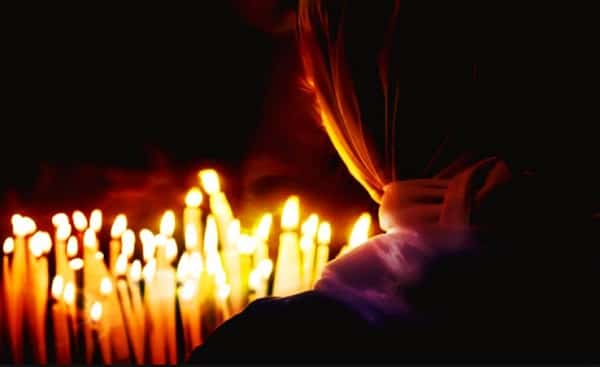
What to do on Dmitrievskaya Parents' Saturday
In Rus' it was believed that this day marks the transition from autumn to winter. Began very coldy, for which people prepared in advance. Despite the fact that many tried to complete their work on the farm even before Intercession on October 14, some for some reason did not have time to do this, and then they tried to complete the preparations before Dmitrievskaya Saturday.
The funeral meal is held after the service. On Dmitrievskaya Saturday, it is customary to set a rich table, which must include dishes that your deceased loved ones loved during their lifetime. The most important dish on the table was pies: the housewife had to prepare a lot of pastries with different fillings. In ancient times it was believed that this could appease and please the deceased.
During the funeral meal, it was necessary to place a separate clean plate on the table, where each relative put one spoon of his food. This dish was left overnight so that the deceased could come and eat with his family.
Before parents' Saturday, on Friday, the hostess after dinner must clear everything from the table and lay out a clean tablecloth. Then re-set the table and place freshly prepared dishes. Thus, in ancient times, the deceased was called to the table.
On Dmitrievskaya Parental Saturday, the family of the deceased should remember only good things about him, share warm memories that are associated with the deceased. This way you let the soul of the deceased know that you still remember and love him.
Despite the fact that during many church events it is strictly forbidden to do household chores, this does not apply to Dmitrievskaya parental Saturday. On the contrary, on this day you should spend general cleaning and then wash yourself. Our ancestors always left a fresh broom and clean water in the bathhouse for the deceased in order to appease the soul of the deceased. The most important thing is that your household chores do not interfere with attending church.
 WE RECOMMEND!
WE RECOMMEND!
Save nature - buy an artificial Christmas tree! Odorless, durable, effective and practical. Passed all inspections of the Sanitary and Epidemiological Service and has all the necessary quality certificates. Delivery to any region of Russia within 5 days. New Year's garland for the Christmas tree as a gift!
On Parents' Saturday it is customary to go to the cemetery. The grave of the deceased needs to be put in order and cleaned. After this, pray for the repose of his soul.
On St. Demetrius Saturday, it is customary to feed the poor so that they pray for the soul of your deceased relative.
How to remember: Prayer for the departed
Rest, O Lord, the souls of Your departed servants: my parents, relatives, benefactors (their names) and all Orthodox Christians, and forgive them all sins, voluntary and involuntary, and grant them the Kingdom of Heaven.
It is more convenient to read names from a commemoration book - a small book where the names of living and deceased relatives are written down.
There is a pious custom of conducting family memorials, reading which both in home prayer and during church services, Orthodox people remember by name many generations of their deceased ancestors.
As a rule, bread, sweets, fruits, vegetables, etc. are placed on the canon. You can bring flour for prosphora, Cahors for the liturgy, candles and oil for lamps. You are not allowed to bring meat products or strong alcoholic drinks. 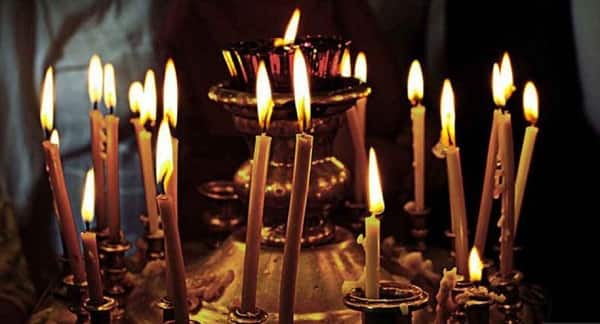
Signs for Dmitrievskaya Parents' Saturday and sayings
When it was warm outside, they said: “The dead are happy for us.” During Grandfather's Week, parents will also sigh. If your parents are alive, honor them, but if they are dead, remember them. The grandfathers did not know trouble, but the grandchildren knew torment. Do not remember the deceased with evil, but with kindness - as you wish.
- Remember the living with goodness, and the dead with green wine.
- No beer, no wine - and no wake.
- Man is born to die, dies to live.
- The earth is heavy, but when you pour some beer and wine on it, everything will become easier.
- Remember good, forget evil.
- A Russian person cannot live without relatives.
- A man is strong with his family. And the field is great, but not native.
- Dmitriev's Saturday - work for the partygoers.
- Drink, don’t regret, remember more joyfully.
- With cheerful memorial workers and the dead, it is more fun.
- The girls are cunning on Dmitry (they are going to get married, so after this day there are rarely weddings in the villages before the winter meat-eater).
- Round dances from Yegor, gatherings from Dmitry. It’s not always Saturday for the priestly guys of Dmitriev. Parents will have a rest during Grandfather's Week, there will be a thaw - the whole winter will be warm.
- During Grandfather's Week, all of Rus' resembles a single great candle.




